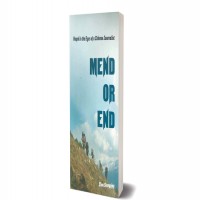A Well Intentioned Advice
Mend or end! A not-so-subtle word of caution from journalist Zhou Shengping about the fate that awaits Nepal if the country’s leaders do not change their ways. Zhou has been in Kathmandu as the bureau chief of Xinhua News Agency since 2012 and, in that capacity, has met top leaders of all the major political parties. His warning ‘Mend or End’ is based on his observations and experiences from these meetings and interactions and his nearly decade-long stay in Nepal.
Nepal is waiting a transformation to happen. Its location between the second and the seventh largest economies of the world gives it access to so many doors. But ultimately, Nepal is the one that has to open them and walk inside, something the leaders do not seem interested in doing. Zhou, in his book, notes that the politics in Nepal is driven by a lust for power and not by the will to do good for the people.
The individuals at the top are divided along party lines and the parties themselves are again divided into factions and sub-factions. So entrenched are these divisions that the possibility of everyone coming together for anything, good or bad, seems tragically remote. And this is what is holding Nepal back, Zhou says.
Now, with the benefit of hindsight, we can say that the coming together of Nepal’s political forces is not as rare as the writer worries it to be. They did come together to promulgate the constitution in 2015 and again to update Nepal’s map to include the territory of Lipulekh, Limpiyadhura and Kalapani in 2020. Unfortunately though, this unity is the exception rather than the norm in matters of national interest.
Zhou is also equally concerned about Nepal’s economy. It bothers him that Nepal has not been able to exploit its hydropower, agriculture and medicinal herbs sector to boost its income and he blames this on the nation’s political instability, corruption and brain drain. But the thing the author seems most worried about is Nepal’s unhealthy dependence on remittance. If something blocks this, the country can go bankrupt.
This book, divided into five chapters and 62 units, isn’t just warnings and worries. It talks about everything from Nepal’s culture to society to the environment. But at the end of the day, all of it links back to politics and governance which have repeatedly been holding the country back and letting the Nepali people down.
Moving away from the content and into the presentation, the book isn’t boring. Each unit leads to the next and the whole 196-page volume is neatly tied under one overarching theme – mend or end. The writer is skilled enough to attract the reader’s interest and then keep it. The chapters are neither long nor short and the narrative is never broken. Even though the book is a collection of separate articles, analyses, interviews and news items written by Zhou, they do not feel disjointed. The volume reads like a novel with the plot moving forward and the reader continuously discovering new and interesting facets of Nepal’s relationship with China.
This book is also not unwittingly condescending. Often, when people from prosperous countries talk or write about countries less developed than them, they become condescending. They view the country with pity and unintentionally (or perhaps intentionally) end up looking down at them. Their books perpetuate the notion that these countries have nothing and are inferior to the writer’s nation in every way.
This is an offensive and problematic outlook to have about a country and its citizens and fortunately, the book ‘Mend or End’ does not have this. The author does not come from a place of superiority, he comes from a place of love. Having spent almost a decade in Nepal, the author truly wants the country to move forward and achieve its true potential.
It bothers him to see the dreams of the Nepali people being crumpled by political leaders with misplaced priorities and this book is a way of telling them to correct themselves. This book does not tell its readers, “Oh look how terrible Nepal is.” Instead, it tells them, “Look how great Nepal can be.” This book, despite its ominous title, is hopeful.
The book is primarily aimed at Nepali leaders. Quoting leader Mao Zedong, it tells them to “seize the day, seize the hour.” It calls them out for their promises to make Nepal the next Switzerland or Singapore and instead, asks them to make Nepal Nepal. It also makes it clear that China stands ready to help Nepal reach great heights but only if Nepal wants it to.
Apart from talking about the heavier themes of politics and economy, the book also includes Zhou’s personal experiences of travelling to places like Mustang. The book also has colourful photos.
The book is a warning from a friend. “Wake up Nepal. The slaughterhouse of failure is not your destiny. An immobile Republica fails to show your destiny. Only a paltry amount of your muscles do you flex. Feed yourself and keep yourself alive,” it says.
Recent News

Do not make expressions casting dout on election: EC
14 Apr, 2022
CM Bhatta says may New Year 2079 BS inspire positive thinking
14 Apr, 2022
Three new cases, 44 recoveries in 24 hours
14 Apr, 2022
689 climbers of 84 teams so far acquire permits for climbing various peaks this spring season
14 Apr, 2022
How the rising cost of living crisis is impacting Nepal
14 Apr, 2022
US military confirms an interstellar meteor collided with Earth
14 Apr, 2022
Valneva Covid vaccine approved for use in UK
14 Apr, 2022
Chair Prachanda highlights need of unity among Maoist, Communist forces
14 Apr, 2022
Ranbir Kapoor and Alia Bhatt: Bollywood toasts star couple on wedding
14 Apr, 2022
President Bhandari confers decorations (Photo Feature)
14 Apr, 2022










